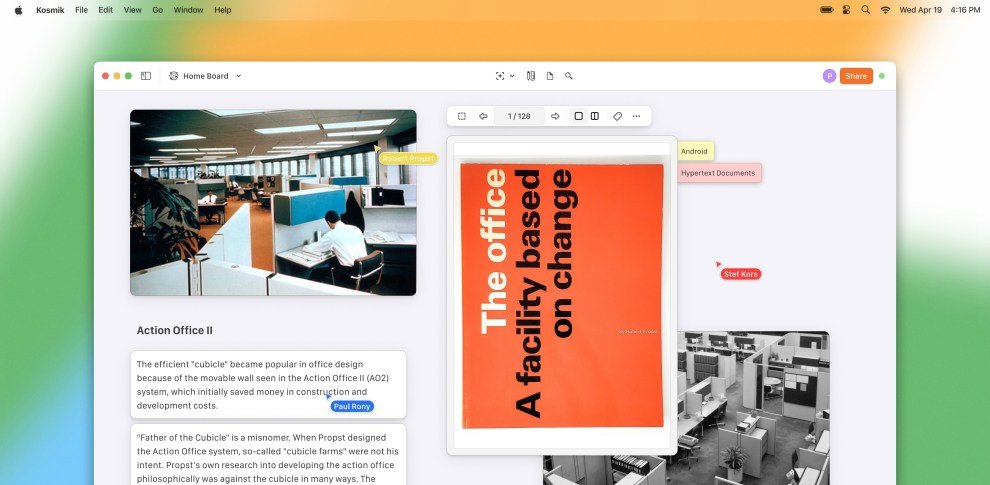Meet Kosmik, a visual canvas with an in-built PDF reader and a web browser. Tools like Figma, TLDraw, Apple’s Freeform, and the Easel feature of the Arc browser have been pushing the notion of using an “infinite canvas” to capture and share ideas in recent years. The French company Kosmik is expanding on that basic idea by using a knowledge-capturing tool that eliminates the need for the user to navigate between windows or programs.
In 2018, Paul Rony and Christophe Van Deputte established Kosmik. Before that, Rony was a junior director at a video production business. Instead of files and folders, he wanted a single whiteboard-style canvas to store notes, drawings, movies, PDFs, and webpages. At that point, Rony told TechCrunch he began working on Kosmic, utilizing his previous computer theory and history knowledge.
“We needed nearly three years to develop a functional product with essential features like offline mode, data encryption, and a spatial canvas user interface,” Rony said. “Since we built everything on IPFS, there is no need for a server-based architecture—when two people work together, everything is peer-to-peer.”
Text, photos, videos, PDFs, and URLs may be inserted into Kosmik’s endless canvas interface, which can be accessed and reviewed in a side panel. Additionally, it has a built-in browser that helps users access relevant website links without switching windows. The software also has a PDF reader, allowing users to extract text and photos.
Designers, architects, consultants, and students may create information boards for various projects with the help of this application. They can utilize the tool instead of opening multiple Chrome tabs and entering details into a document, which isn’t the most visually appealing way to present different materials. Consultants use the app for their project boards, and some individual investors use it to track stock prices.
Rony underlined that Kosmik’s main selling point is integrating these many products into one location.
“I believe that everything is centered around the notion that our web browser, text editor, or PDF reader is subpar,” Rony remarked. “However, the tool becomes incredibly powerful because we let them exist together in the same space and you can drag and drop objects between them.”
Kosmik is available on the web, Mac, and Windows. It comes with a basic free tier; however, it can only save 5GB of data and hold 500 canvas “elements” and 50MB of files. The startup charges $5.99 monthly for a subscription with additional storage and infinite features. They plan to provide a “pay-once” option for anyone who wants to use the program on one device.
Increase by twofold
Today, Kosmik announced that it had received $3.7 million in a seed round of funding, which also included Alven, Kima Ventures, Betaworks, and the makers of Quizlet and Replit.
The principal at Creandum, Hanel Baveja, told TechCrunch that the company chose to invest in Kosmik because it had a vibe similar to Notion and Miro and could create something that completely altered how businesses operated. But like every consumer tool on the market, Baveja stated, the firm must provide customers with instant value.
“Any product you want to become a daily product for, you only get one chance to draw in a user, so your time-to-value has to be quick,” Baveja stated. One difficulty that the Kosmik team has continued to focus on is balancing ease of adoption and a robust feature set.
Considering the upcoming product iteration, this funding infusion is also appropriate. Kosmik is combining its codebases, and Kosmik 2.0 will add feature parity to the mix. The new application will be web-based, and the desktop clients will only function as wrapper applications.
The updated version will also have capabilities like AI-powered item auto-tagging for photos and multiplayer cooperation.
According to Rony, the multiplayer option allows you to work with a partner on a specific canvas area by utilizing a “card” that resembles a folder and has things put inside of it, as opposed to sharing the entire board.
While Kosmik launched for business in March, it now boasts about 8,000 daily users. However, the company notes that it is difficult to pinpoint the precise number of users because the product may be used entirely offline.
It is noteworthy that other startups operate in the personal whiteboard area besides Kosmik. Sane is creating a social knowledge-sharing network, and Berlin-based Deta is developing a new cloud operating system. These businesses will have to compete in some way to draw in users and persuade them to explore a novel approach to knowledge capture.


















































